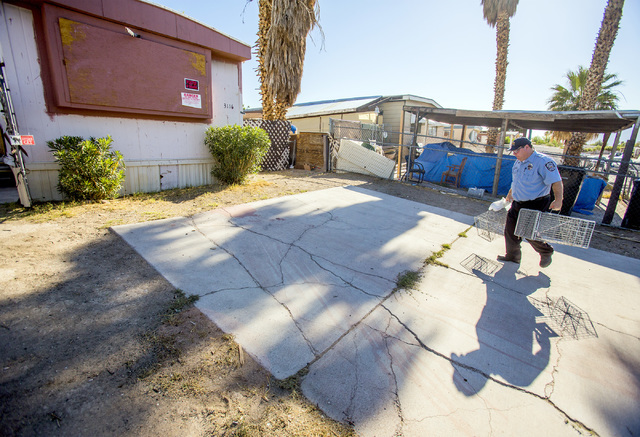Metro advises residents to be on high alert for squatters
Dark yellow bottles of an unidentified liquid and old ramen noodles sit next to empty beer bottles at a popular undisclosed squatter location in North Las Vegas. During a random visit, North Las Vegas Police Department Officer Scott Vaughn discovers a woman who has been squatting inside the small shack.
This encounter doesn’t surprise Vaughn, who has seen it all — narcotic operations, prostitute rings and people just trying to find shelter. The department is aware of the squatter situation and makes it a priority to visit popular squatter areas to keep people away.
“We’ve become a national leader on dealing with squatters,” said Ward 3 Councilwoman Anita Wood. “Once we figured how to handle this situation in a successful way, we found that everyone was willing to jump on board. Right now, it seems like we have a pretty good handle on the problem.”
Squatting was first brought to Wood’s attention a few years ago.
“Residents were telling me that they called the police to report a crime — squatting — and they didn’t do anything,” Wood said. “They didn’t realize how difficult it was for the police department to act because oftentimes, if they produced a lease, it was considered a civil matter, not legal. I started asking the city, ‘What can we do about it?’ ”
After investigating, Wood realized that the departments, such as code enforcement, were getting information but not sharing it.
She created the squatter task force in May 2014, and the city began requiring banks to register properties with the city, so city officials knew if a property was in foreclosure. Wood also began working with other entities, such as NV Energy, Southwest Gas, the Nevada Bankers Association and the Greater Las Vegas Association of Realtors (GLVAR).
She warned banks about the “Cash for Keys” program, which was creating serial squatters. If foreclosure is imminent, and someone is considering a deed in lieu of foreclosure — a transaction where the homeowner voluntarily transfers title to the property to the lender in exchange for a release from the mortgage obligation — some lenders are willing to pay someone to vacate a home in a timely fashion. The money exchanged, which can vary from $750 to $30,000, is intended to pay for relocation costs.
Soon, the police department learned how to differentiate between a squatter and the victim of a scam.
“When I arrive at a squatter home, 99.9 percent of them say that they found the house on Craigslist,” Vaughn said. “I’ll ask them questions like, ‘Do you have the receipt and contact information of the person who leased it to you?’ You start punching holes in their story.”
The team works closely with city code enforcement officer Matthew Meanea. He handles all of the research to ensure that the property is in foreclosure or vacant and finds out if any utility services were unlawfully turned on in someone else’s name.
“From start to finish, it can take anywhere from an hour to three days on average to vacate someone from a property,” Vaughn said.
“One of the secrets to the success of the squatter task force is the support from the top down and leadership and chain of command,“ Meanea added. “It’s all about synergy.”
The utility department also plays an important part. When a person goes in to present his lease, the utility department contact will add the name to a system, which will flag the account if the property is under the ownership of the bank.
If someone is truly a victim of a scam or if children are involved, Vaughn makes it a point to offer contact information to shelters for help. Similarly, Metropolitan Police Department Lt. Nick Farese works to verify any claim that a squatter makes.
It’s all about using common sense, Farese said. He asks questions such as: Is it reasonable to live in a $2 million home when they are making less? Why did they pay rent in cash and not get a receipt? Why are there no emergency contacts listed on their lease?
“We’re constantly dancing a fine line between criminal and civil,” Farese said. “This is more complicated than identity theft or credit card fraud. In a perfect world, we could probably get one case done in a week or two, but sometimes, it takes months because of the legalities of it all.”
The Henderson Police Department and the GLVAR also have partnered to combat squatters living illegally in vacant or distressed homes through a new tool. A series of forms have been created to help Realtors navigate the process when they need to have squatters removed. Thus, when Realtors encounter unlawful occupants, they are advised to immediately leave the area and fill out the the police department’s “Housebreaking Victim’s Packet” and submit it to detectives at the main police headquarters on Water Street to begin the process of removing occupants from the dwelling who they feel are living in their client’s homes without permission.
Henderson has assigned officers to investigate the alleged offenses, and if deemed to be criminal, police would be authorized to remove the squatters.
What should neighbors do if they think they spot a squatter in the area?
“We don’t encourage people to confront occupants of homes who are believed to be squatters,” Meanea said. “There may be criminal activity going on inside, or they may not be squatters at all. Instead, call us.”
Henderson Police Sgt. Kirk Moore added that neighbors play an important role in addressing squatters.
“Squatting is not spiraling out of control anymore,” Moore said. “People are starting to get arrested, and the word is traveling in the squatting community that there’s a high likelihood of getting caught.”
Farese added that the more that residents know about the home’s previous owner, the easier it will be for the department to tackle the situation. Sometimes, SWAT has to get involved, but only in instances when there are illegal activities that require its involvement. This, however, can prolong the process.
“On my street alone, we’ve had two houses that were occupied by squatters,” said Lori Orchow Haney, a Summerlin resident. “We were really suspicious of the last group when they suddenly mounted surveillance cameras on the house. We had called Metro multiple times, and then one afternoon, SWAT descended on the house. The squatters escaped through the front window, but Metro found drugs, money and weapons. The strangest thing was that Metro never secured the house, so later that night, they returned and took their surveillance cameras and left. They run up the power bill, leave the house full of trash, etc. It also has a serious scorpion problem from leaving the back door open for weeks.”
Haney said despite having a husband who is a former Metro officer, it’s been hard to tackle the situation.
“I’ve called the Community Policing line and left messages. When they call back, which is infrequently, they tell us there’s nothing they can do,” she said. “It’s ridiculous to think I could just move into a vacant house and take it over, destroy it, let others live in it and the police can’t or won’t do a single thing.”
Farese said there are many challenges to tackling the situation.
“We just don’t have the manpower to tackle this head-on,” he added. “There are too many violent crimes, and we put cops on robberies and murders and shootings before squatters. It’s just a matter of finding the time and balance.”
Another challenge is that Las Vegas is a transient community, so it’s common for neighbors not to know each other by name, Farese said.
“The public needs to understand that they can’t just call 311 or 911 to report a squatter. There’s a process that we need to follow before we make an arrest. It could take a week or two or a month or two. We just don’t have the manpower, but we are aware of the problem and doing our part to address it.”
To reach North View reporter Sandy Lopez, email slopez@viewnews.com or call 702-383-4686. Find her on Twitter: @JournalismSandy.
View Squatting Series
This is part three of a three-part series on squatting in the Las Vegas Valley.
Part 1: Special police units work to combat squatters in Las Vegas Valley
Par 2: Many squatters know and exploit Nevada laws to remain in homes for free
For more about why people squat, read: Some squat in abandoned homes as survival, others as lifestyle choice



























